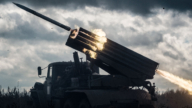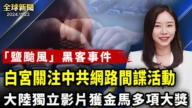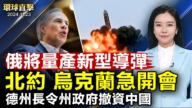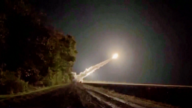【新唐人2012年1月14日訊】在美國財政部長出訪北京要求支持美國對伊朗的新制裁,遭到中方拒絕後,美國出手制裁中國一家國有能源貿易公司。在此之前,伊朗警告:如果石油出口遭到禁運,伊朗將封鎖重要輸油通道霍爾木茲海峽。目前,美國3個航空母艦戰鬥群罕見的集結在波斯灣,伊朗局勢戰雲密佈。
美國財政部長蓋特納日前訪問亞洲,為美國針對伊朗石油出口的新制裁尋求支持,強化施壓伊朗放棄核武器計劃。蓋特納1月11號訪問北京,敦促中國減少從伊朗進口石油,但中共表示拒絕。
北京是華盛頓向伊朗施壓的關鍵。伊朗是石油輸出國組織OPEC中僅次於沙特的第二大產油國,原油日產量約為350萬桶。伊朗石油出口總量三分之一銷往中國,佔中國石油進口總量的11%。
儘管中共在聯合國安理會要求伊朗停止鈾濃縮的決議案中,投了贊成票,但是,北京反對美國單方面對伊朗採取制裁,希望這些制裁不會影響到中國的利益。
「紐約城市大學」政治學教授夏明表示,北京反對美國制裁伊朗,還有更深的戰略考量。
夏明:「中國顯然不願意幫助美國,因為中國跟伊朗是重要的戰略合作關係,因為它們面臨共同一個敵人,那就是美國。另一方面,因為中國現在確實是在過去的十幾年尋求國際能源的過程中,它想獲得更多的能源供應基地。」
在美國財長訪華沒取得成果之後,美國國務院12號宣佈對中國「珠海振戎公司」實施制裁,指稱這家公司是伊朗最大的成品油貿易商,同時遭到制裁的還有新加坡和阿聯酋的兩家公司。
歐盟已就禁止進口伊朗石油達成原則性共識,韓國和日本擬將減少對伊朗石油的進口。不過,日本首相對美國財長表示,擔心美國制裁伊朗可能給日本和全球經濟帶來的影響。
在過去一個月,中國的石油公司因為價格糾紛而減少了對伊朗原油的購買。《美國之音》援引分析說,中國可能成為美歐對伊朗制裁的最大獲益方,因而獲得價格上的優惠。
11號,一名任職於伊朗核設施的伊朗科學家在德黑蘭,被安裝在汽車上的磁性炸彈炸死。伊朗指責美國和以色列是這一襲擊的幕後主使,美國則表示否認。
伊朗近來揚言,如果西方對伊朗石油禁運,伊朗將封鎖佔全球石油運輸近40%的重要通道霍爾木茲海峽。伊朗最近舉行了大規模海上軍演,並試射了三枚巡航導彈。
美國警告說,美國絕不會容忍伊朗封鎖霍爾木茲海峽。美國國防部罕見宣佈,美國三個航母戰鬥群將聚集波斯灣,並有英、法、加拿大三國海軍配合部署。
俄羅斯國家安全會議秘書長警告,美國「真的有可能」攻擊伊朗。俄羅斯外交部11號表示,反對對伊朗實施石油制裁。中共外交部則表示,反對對伊朗動用武力。
俄羅斯航母年初進入地中海舉行大規模軍演。美國前資深情報官吉拉爾迪(Philip Giraldi)12號發表文章推演美國與伊朗的戰爭,聲稱最終將引發第三次世界大戰。
夏明:「如果伊朗膽敢切斷霍爾木茲海峽國際石油生命線的話,那我想美國恐怕一定會用武力來保護海峽運輸的自由暢通。如果伊朗它不走這一步,我覺得武力的可能性還不會急劇發生。」
隨著美伊危機升級,法國市場分析師發表報告指出,如果美歐對伊朗石油禁運,原油價格將由現在的114美元,可能升到每桶150美元;如果伊朗封鎖霍爾木茲海峽報復,油價可能升到200美元一桶。
新唐人記者常春、李元翰、周天採訪報導。
3 U.S. aircraft carriers gather in Persian Gulf, Beijing refuses to sanction Iran
After U.S. Treasury Secretary visited Beijing seeking support
For U.S. sanctions of Iran and was refused by Beijing,
The U.S. then sanctioned a Chinese state-owned energy trading
company.
Prior to this, Iran warned if its oil exports were embargoed,
they would blockade the important oil transportation channel,
Which is the Strait of Hormuz. Currently, 3 U.S. aircraft
carriers battle group are gathering in the Persian Gulf.
The situation of Iran is likely to be war.
U.S. Treasury Secretary Timothy Geithner recently visited
Asia, seeking support of U.S. new oil sanction of Iran.
And strengthening the pressure on Iran to abandon its nuclear
weapons program.
On January 11, Geithner visited Beijing, urging China to reduce
Iranian oil imports. But the Communist Party refused.
Beijing is the key for Washington to pressure Iran, which is
OPEC’s second largest oil producer.
Its crude oil production is about 3.5 million barrels per day,
second largest after Saudi Arabia.
One-third of Iran’s oil exports are sold to China, accounting for
11% of China’s total oil imports.
The CCP required Iran to stop uranium enrichment in the
United Nations Security Council resolution.
However Beijing also opposes U.S. unilateral sanctions against
Iran, hoping the sanctions will not affect China’s interests.
Xia Ming, political science professor from “City University of
New York", said:
That Beijing’s opposition of U.S. sanctions to Iran includes
deeper strategic considerations.
Xia Ming: “It’s apparent that China is reluctant to help U.S.,
as China and Iran have an important strategic relationship.
For they are facing a common enemy, which is the U.S.
China has been actively seeking international energy over the
past 10 or so years; it wanted more bases of energy suppliers."
After the U.S. Treasury Secretary’s visit was fruitless,
U.S. State Department announced sanctions on China’s
“Zhuhai Zhen Rong Company on January 12th",
alleging this company is Iran’s largest oil trader.
There were also sanctions applied to two other companies in
Singapore and the UAE.
The EU has reached a consensus in principle of banning the
import of Iranian oil.
South Korea and Japan intends to reduce their imports of
Iranian oil.
However, the Japanese prime minister told the U.S. Treasury
Secretary that he was worried about U.S. sanctions against Iran.
He feared the sanctions would affect the Japanese people and
the global economy.
In the past month, China’s oil companies reduced purchases of
Iranian crude oil because of price disputes.
“Voice of America" quoted analysts saying China may become
the largest beneficiary of U.S. and European sanctions against
Iran, by enabling them to obtain price concessions.
On January 11th, an Iranian scientist working in Iran’s nuclear
facilities in Tehran, was killed with a car bomb.
Iran accused U.S. and Israel as the driving forces behind the
attack. But U.S. denied it.
Iran recently threatened that if the West embargoed its oil, they
will blockade the Hormuz Strait.
This is the important oil transportation channel which carries
nearly 40% of the world’s oil shipping.
Iran has recently held a large-scale naval exercise, and test-
fired three cruise missiles.
U.S. warned that the U.S. will not tolerate Iran’s blockade of
the Strait of Hormuz.
U.S Department of Defense made the rare announcement that
three aircraft carrier battle groups will gather in Persian Gulf.
Navy deployment is also from the three countries of Britain,
France and Canada.
Russian National Security Council Secretary-General warned
that the U.S. may “really possibly" attack Iran.
On January 11th, Russian Foreign Ministry said Russia opposes
the oil sanctions against Iran.
CCP Foreign Ministry said that it opposes any military actions
against Iran.
Russian aircraft carrier went into the Mediterranean and carried
out a large-scale military exercise at the beginning of the year.
On January 12th, former senior CIA official Philip Giraldi
published an article presuming hostilities between U.S. and Iran.
He claimed that it will eventually lead to World War III.
Xia Ming: “If Iran cuts off the Strait of Hormuz, the international
oil lifeline, I think the U.S. would certainly use military force.
They have to protect the free flow of the Strait transportation.
If Iran does not take action, there is little likelihood of force."
With the escalation of crisis between Iran and U.S. some
French market analysts reported on this;
If the U.S. and Europe embargoed Iran’s oil, the crude oil price
would go up to $ 150 from the current $ 114 a barrel.
If Iran blockades the Strait of Hormuz in revenge, oil price
could rise to $ 200 a barrel.
NTD reporters Chang Chun, Li Yuanhan and Zhou Tian.




























